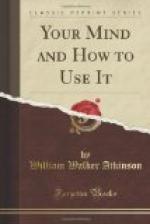A third advantage is that a stock of habits makes life easier. “There is no more miserable human being than one in whom nothing is habitual but indecision, for whom the lighting of every cigar, the drinking of every cup, the time of rising and going to bed every day and the beginning of every bit of work, are subjects of express volitional deliberation. Full half the time of such a man goes to the deciding or regretting of matters which ought to be so ingrained in him as practically not to exist for his consciousness at all.” Have you ever reflected how miserable you would be and what a task living would be if you had to learn to write anew every morning when you go to class; or if you had to relearn how to tie your necktie every day? The burden of living would be intolerable.
The last advantage to be discerned in habit is economy. Habitual acts do not have to be actively directed by consciousness. While they are being performed, consciousness may be otherwise engaged. “The more of the details of our daily life we can hand over to the effortless custody of automatism, the more our higher powers of mind will be set free for their own proper work.” While you are brushing your hair or tying your shoes, your mind may be engaged in memorizing poetry or calculating arithmetical problems. Habit is thus a great economizer.
The ethical consequences of habit are so striking that before leaving the subject we must give them acknowledgment. We can do no better than to turn to the statement by Professor James, whose wise remarks upon the subject have not been improved upon:
“The physiological study of mental conditions is thus the most powerful ally of hortatory ethics. The hell to be endured hereafter, of which theology tells, is no worse than the hell we make for ourselves in this world by habitually fashioning our characters in the wrong way. Could the young but realize how soon they will become mere walking bundles of habits, they would give more heed to their conduct while in the plastic state. We are spinning our own fates, good or evil, and never to be undone. Every smallest stroke of virtue or of vice leaves its never-so-little scar. The drunken Rip Van Winkle, in Jefferson’s play, excuses himself for every fresh dereliction by saying, ’I won’t count this time!’ Well! he may not count it and a kind heaven may not count it; but it is being counted none the less. Down among his nerve-cells and fibers the molecules are counting it, registering it, and storing it up to be used against him when the next temptation comes. Nothing we ever do is, in strict scientific literalness, wiped out. Of course this has its good side as well as its bad one. As we become permanent drunkards by so many drinks, so we become saints in the moral, and authorities and experts in the practical and scientific, spheres, by so many separate acts and hours of work. But let no youth have any anxiety about the upshot of his education,




